from Instagram

from Instagram

from Philly WSA
This Saturday we will travel with our co-workers to No Kings protests, some to City Hall, some to Harrisburg, and some to DC.
As WSA, of course we will be there with our calls for an end to racism and the class system, and an end to genocide – resistance to fascism without mere reformism. We stand for working-class revolution from below!
While the cause we bring is more radical than the event the organizers are broadcasting, it’s crucial for us to be there.
The idea of boycotting or dismissing a mass mobilization for democracy against fascism, does not appeal to us. We want to be IN our workplace and present our views, and WITH our co-workers at Saturday’s protests. For some this will be the first protest they ever attend. Among workers at higher risk, in this time of repressive danger, their willingness to attend a protest is courageous.
We stand internationally with our comrades in the International Workers Association as we deal with this global authoritarian movement, this international threat to immigrant workers and erosion of rights. May the voice of workers this Saturday speak out in solidarity with all at risk, and call for transformation!
from Unicorn Riot
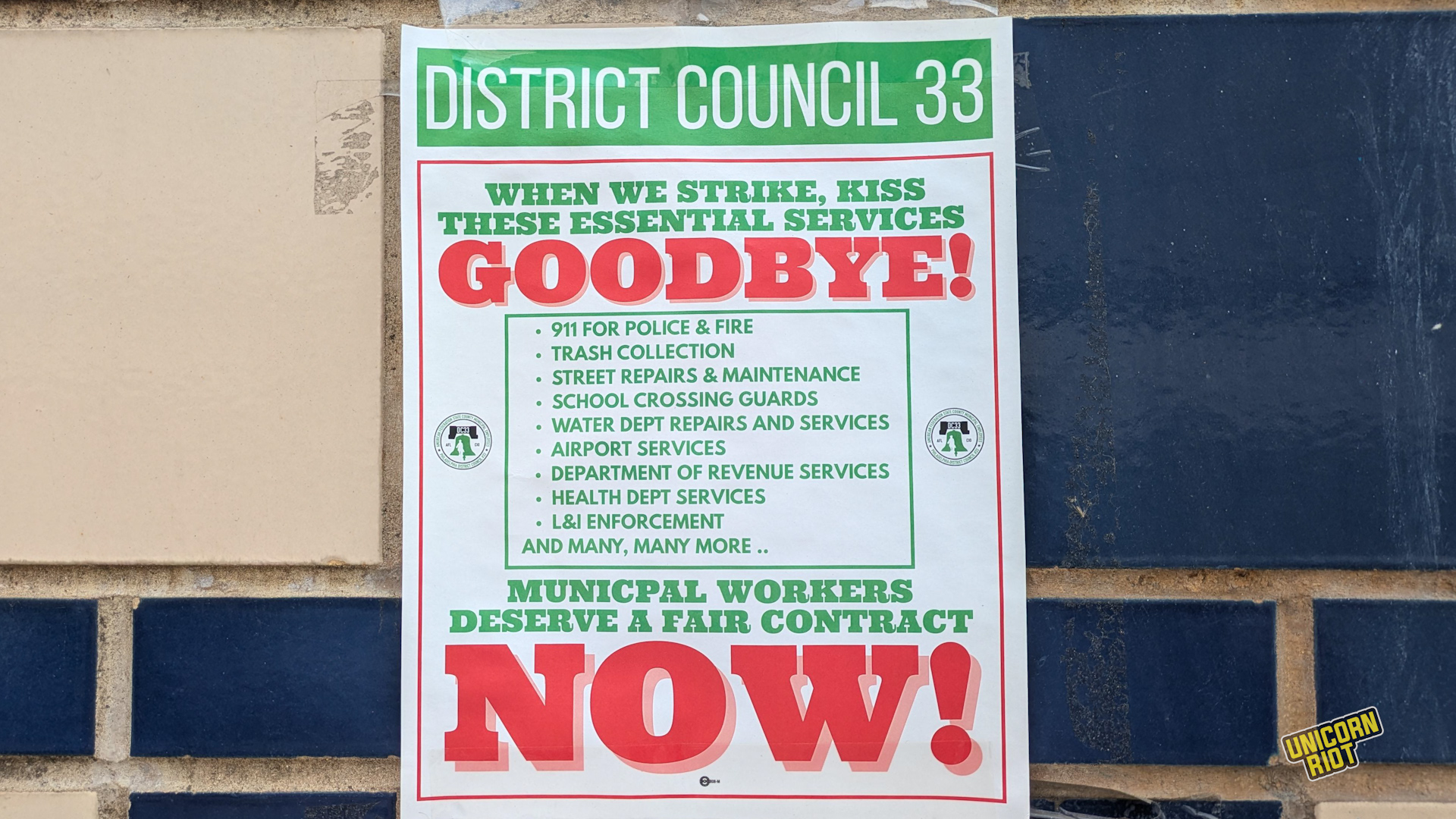
Philadelphia, PA — American Federation of State, County and Municipal Employees (AFSCME) District Council 33 (DC 33), the city’s largest blue-collar union, launched a historic strike earlier this month, halting sanitation services on a scale not seen since 1986. Despite the pro-union image Philadelphia Mayor Cherelle Parker wishes to project, legal injunctions were used to force many city employees back to work – creating pressure to end the strike.
“The city was trying to pick us apart with injunctions all over the place,” requiring water department employees, 911 dispatchers, and city medical examiners to return to work immediately, DC 33 President Greg Boulware explained in a recent interview.
After reports of alleged sabotage and confrontations with scabs (non-union workers hired to replace strikers), another court order demanded a stop to “unlawful activity” at picket lines, but included additional stipulations such as limiting pickets to 8 workers and requiring pickets to stay 10 feet away from entrances. With weaponized judicial pressure mounting, on the early morning of July 9, DC 33 reached a tentative three-year agreement with the city of Philadelphia that ended the eight-day strike.
“You can’t claim to be pro-labor, pro-union, pro-worker and then not make steps to do things that would change the economic status to do things,” said Boulware.
“The Mayor also tried to connect the housing initiative [a public benefit designed for ‘low-wage workers, under-employed or unemployed, municipal and union workers…’] to our membership, which had nothing to do with it at all. If you have a program in place try to get poor folks into housing, once they’re in that housing they have to afford to live in that housing…”
DC 33 President Greg Boulware
Sanitation workers in Philadelphia earn the lowest salary of any major city in the US. According to the MIT living wage calculator, the current average salary of a DC 33 member is more than $2,000 below the wage needed for a single adult without children to live in the city. For a family with one child, the living wage gap nearly doubles. One worker on the picket line said she couldn’t afford to buy diapers on her current salary. Depending on family size, the average city worker may be eligible for public assistance.
As garbage collection returns to its regular schedule this week, DC 33 members have until Sunday, July 20, to vote to accept the new agreement, or reject it – which may lead to a second strike authorization process. Many striking workers demanded no less than a 5% increase in their current pay, down from the 8% annual increase DC 33 initially proposed in negotiations. The tentative agreement only offers a 3% increase year-over-year, not far from the city’s original offer that led to the strike in the first place. The union vote will be announced on Monday, July 21.
Despite the anti-union tactics and lawfare by the city, many strikers stood true to their purpose of trying to win better economic treatment on the picket line. Unicorn Riot was able to speak with one DC 33 ‘Strike Captain,’ an unofficial point person informally designated by the union, about where things are potentially headed and how the strike went down. This interview was conducted on the condition of anonymity and represents their individual perspective and experience.
Unicorn Riot: How did DC 33 union members react to the announcement of the tentative agreement reached with Mayor Parker’s administration to end the strike, considering the terms were far below many of the strikers’ demands?
Anonymous DC 33 Worker: A lot of people are like, “What happened in there?” Because from a lot of picket lines it looked like we were doing OK. People could see the rotting trash getting worse and the understanding was that with more time, we had more leverage.
Even though people were missing paychecks, what I’ve heard from coworkers across the board is that if we were already striking, we should’ve waited longer. They don’t really understand what happened.
I don’t hear a lot of talk that [DC 33 President] Greg Boulware sold us out or anything. I have heard people say it’s suspicious that the AFSCME national President [Lee Saunders] sat down at the table with them the day that we folded.
I’ve heard that we should’ve struck for longer. People just don’t really understand how we went from guns blazing to folding immediately.
There’s a lot of questions about what a ‘No’ vote would look like. It’s hard, because the issue is that things are not really structurally coordinated, so even the idea that we would purposely try to track like, “OK, here’s our membership and let’s try to talk to everybody about whether they’re asking to vote ‘Yes’ or ‘No’ or just to get out the vote” is not intuitive, I’m finding, even though it’s like, to me, kind of what labor organizing is.
At this point, enough [DC 33 members] are individually pissed that the majority of the people who show up might vote ‘No.’ The majority of the people who show up probably won’t be a majority of the union. So if the issue is that people weren’t showing up to strike, having a majority of a minority vote ‘No’ doesn’t solve that problem. The way I’m talking about it with people is, you certainly should vote to show that people are engaged in the union on this.
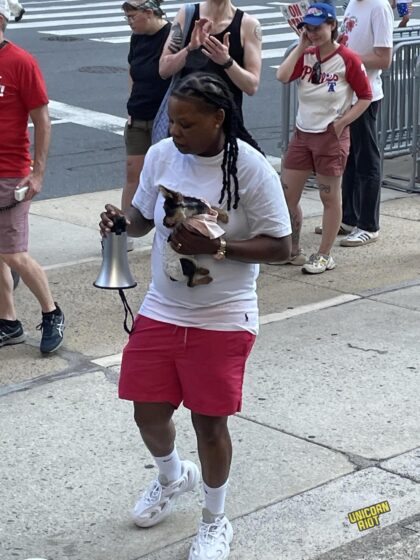
I’m personally not in support of any kind of coordinated “Vote No” campaign unless it has an ask associated with it. If we wanna do a coordinated “vote ‘No’ until we see this very specific possibly winnable clause added,” then that would be one thing. But I’m wary of the idea of “just vote no,” because I think our leadership tried to get the best they could. Like, I do kind of believe that Greg Boulware got the best he could under the circumstances from where he was sitting and could see everything. So I hesitate to be like, yeah, vote no and that will suddenly mean we have all this leverage. If it wasn’t there, it wasn’t there.
There’s a lot of confusion and misunderstanding about what things trigger what actions. A lot of people saw the letter saying that the [DC 33] local Presidents, the executive board, had voted to send this Tentative Agreement to the membership. And they were like, “oh, do we not get to vote then?” And it’s like no, that’s who voted to end the strike, that’s not the vote [to ratify the tentative agreement].
UR: The tentative agreement (TA) isn’t ratified until you all vote, right?
DC 33 Worker: Yeah, but a lot of folks just saw that and thought, “oh, every local voted and so that’s done now.” So there’s a lot of talking to people about that. I’m not saying they don’t understand, but they are not receiving any information about how this stuff works.
UR: One thing that was somewhat unique about this strike was the amount of intersectional movement support that we don’t always see with Philly unions. For instance, the Sunrise Movement staging a sit-in at City Hall supporting the workers’ demands is not something we typically see in other municipal services or other strikes in Philadelphia. Why do you think that is?
DC 33 Worker: Municipal strikes, and public sector strikes in general, depend upon public opinion. We could’ve done more with public opinion. Ideally there would’ve been more flyering, more encouraging people to co-worker-organize themselves by talking to their own social networks and getting their churches and community groups on board with the strike.
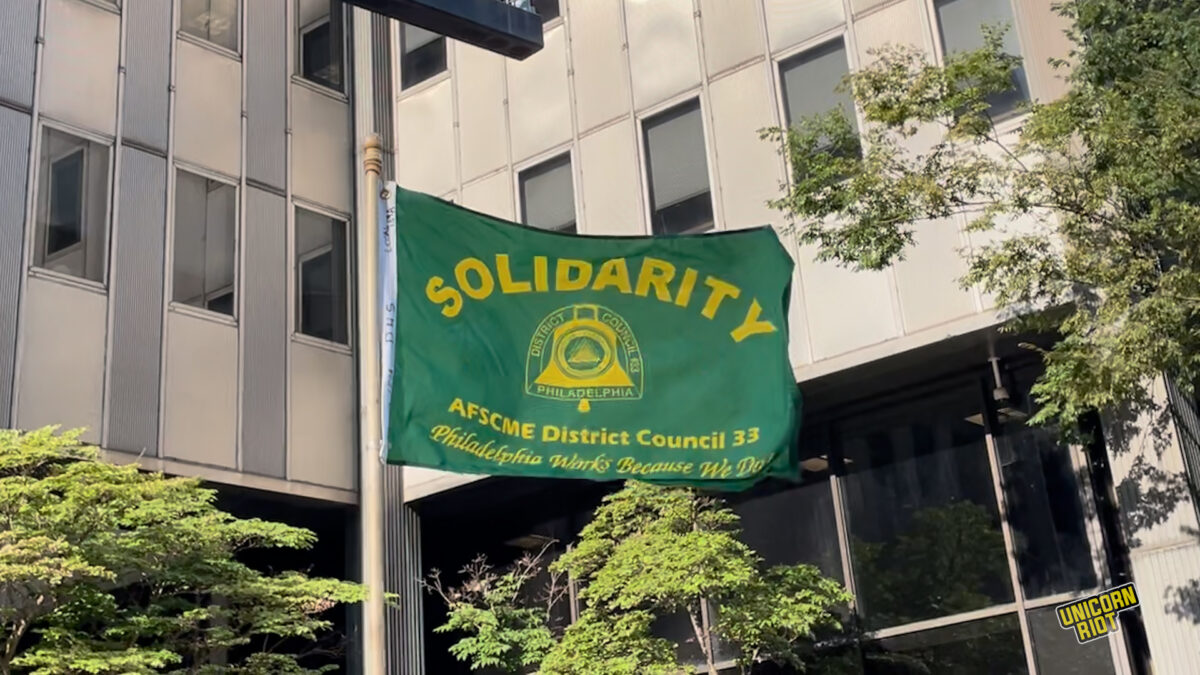
DC 33 Worker: I appreciate that community groups with less organic connections to us stepped up to do tactics that the union technically could not do. I can’t do certain behaviors without risking getting my own picket line and all the picket lines further injunctioned. But if the people of Philadelphia feel so inclined, then that’s their business.
UR: How do you see the DC 33 strike within the larger context of racial injustice, extreme poverty, and economic inequality in Philadelphia?
DC 33 Worker: One of the reasons we were able to come out with the force that we did – even while some chunks of the union did not have the same level of organization as others – is that historically DC 33 workers don’t make enough money to send their kids to college, and so the best jobs they can get are in DC 33, so there are these tight inter-generational networks within DC 33.
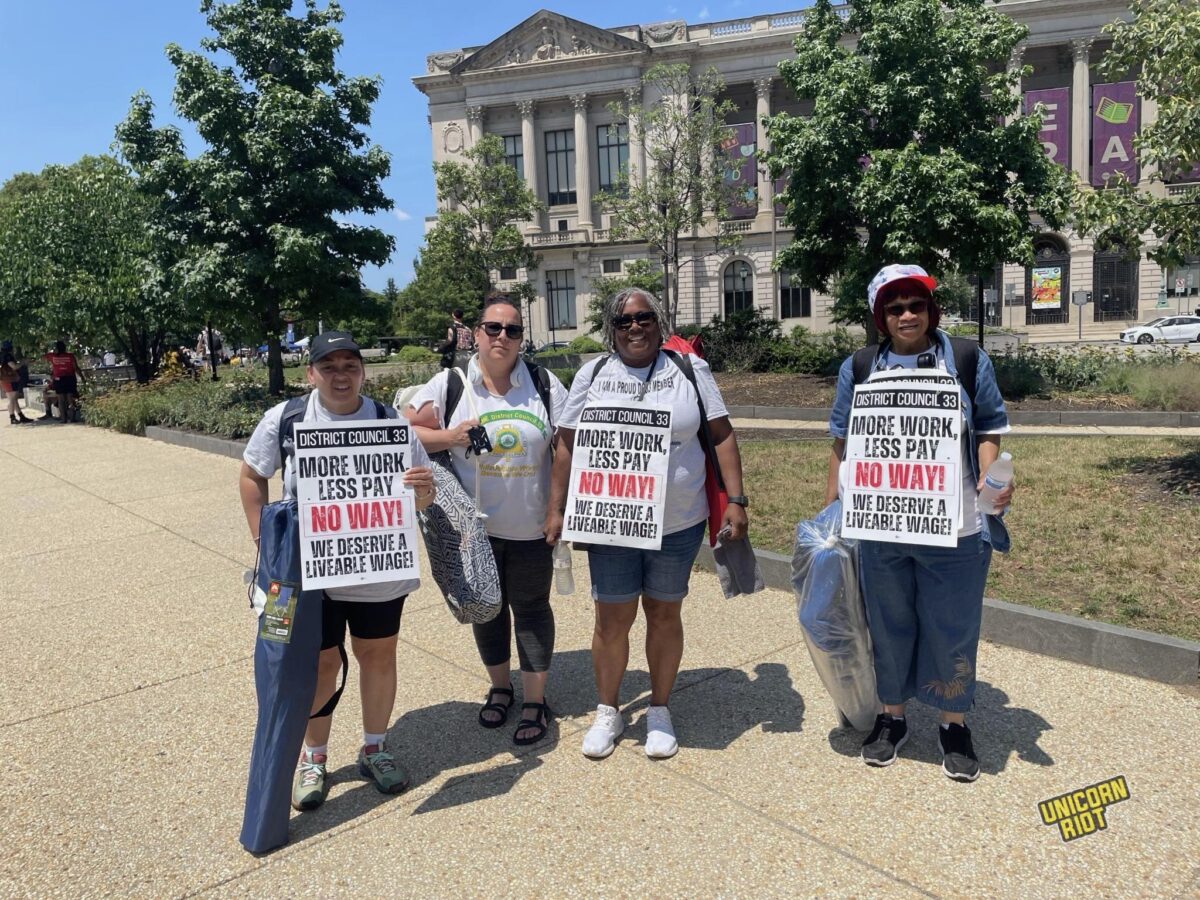
DC 33 Worker: It’s hard to live in Philly for more than a few years and not know somebody in DC 33, or be related to someone in DC 33 in some way. That’s one of the reasons there was such a staunch “we do not cross picket lines” feeling inside the union and in the city going into this.
I see a lot of people online saying, “oh, they folded because people are running out of money.” But people in a tough financial situation are often still sharp enough in their political development to understand when something is worth their while even if it’s going to cost something in the short term. I didn’t hear of anybody crossing [a picket line] because they were running out of money and thought that they financially needed to scab.
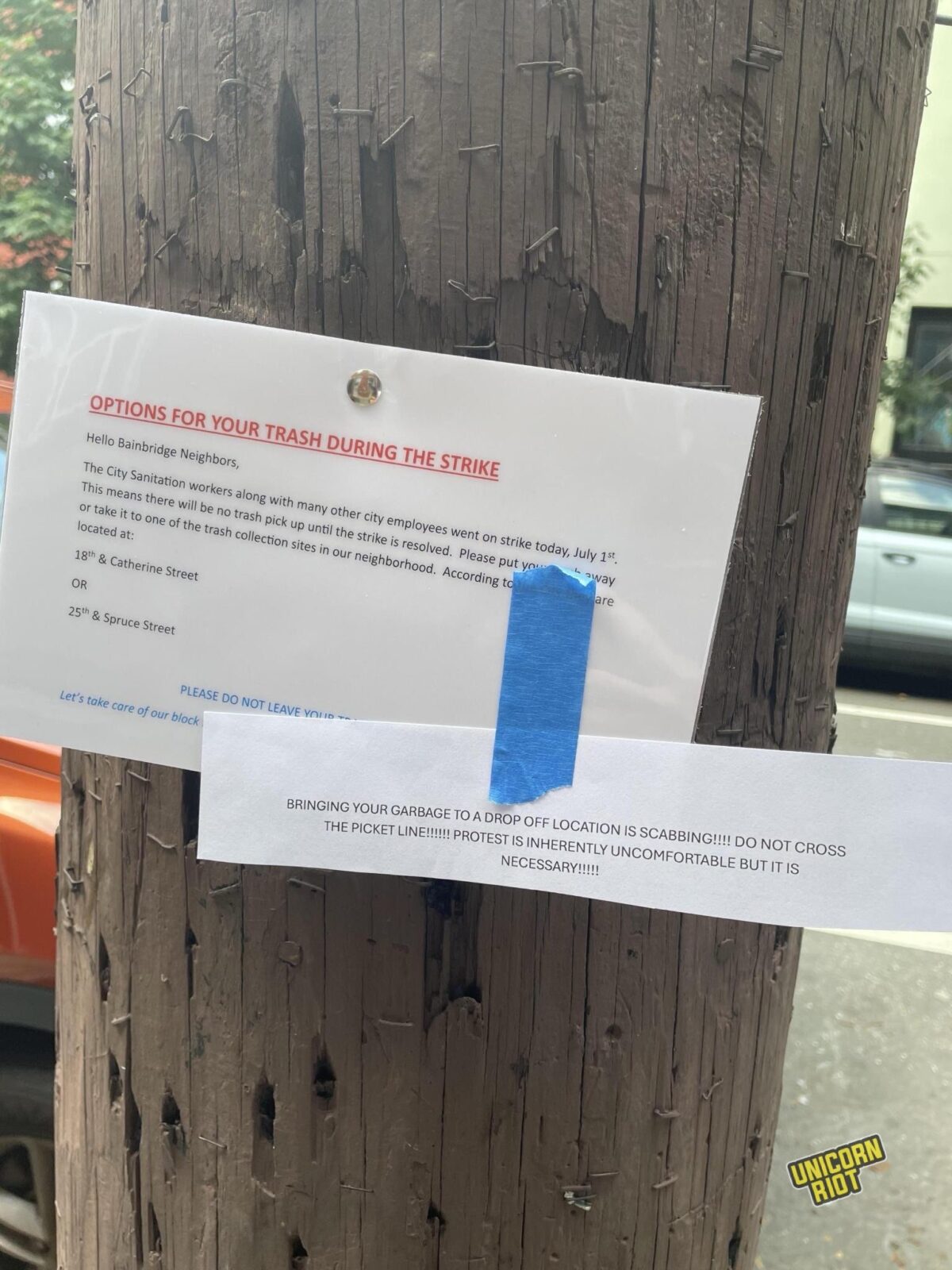
UR: Other than the injunctions and the city bringing in scabs (non-union workers) to do strikers’ jobs, what challenges did you see facing the strike?
DC 33 Worker: The biggest thing would be the chunk of [union] people who decided to stay home instead of show up and picket, we’re more concerned about that than people who potentially crossed [a picket line]. But that’s a question of, like, how do you build power in unions in between strikes? That was never gonna just come together.
UR: Moving forward, what you said about, if people decide to vote ‘No’ there should be a specific demand, what do you see happening? Does it sound like people would overwhelmingly vote ‘No,’ or does it sound mixed?
DC 33 Worker: I haven’t talked to anybody who is thrilled about this and wants to vote ‘Yes.’ I hear people who are not convinced a ‘No’ vote would do anything and so may not show up or may show up and vote ‘Yes’. I’m not hearing people who feel good about this or are excited about this.
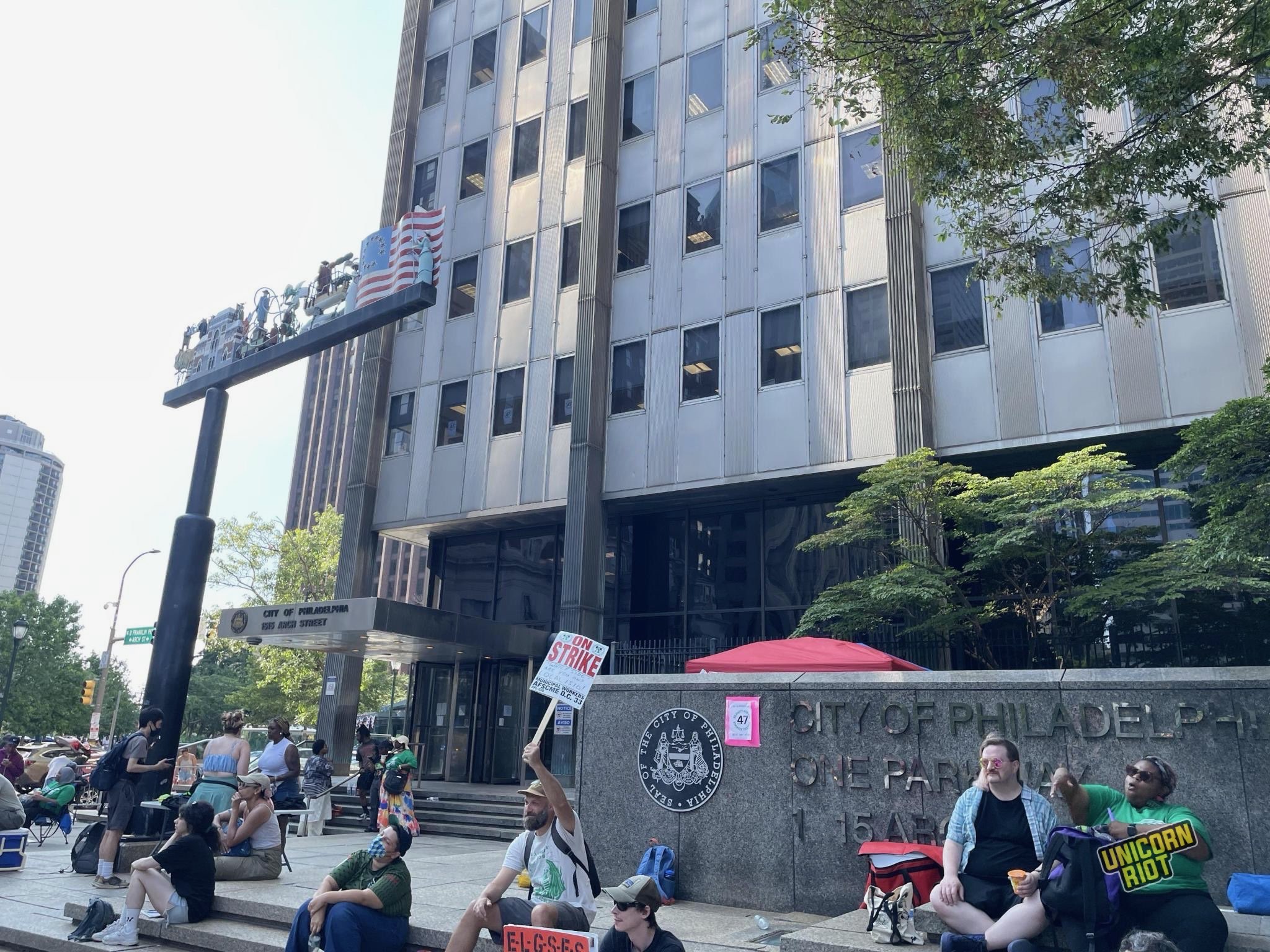
DC 33 Worker: I don’t think – short of having a second historic strike – that we’re gonna come out with a drastically different contract than we have now, even with a ‘No’ vote. If there’s any internal organizing that happens, I would hope that it would be responsible about inoculating people about what is and isn’t possible from here, so that people don’t get even more disappointed with things. More than anything, we don’t want people to swear off union politics for good. That’s not going to get us the contract that we want next time.
So I’m concerned about that when people talk about ‘No’ campaigns. But when it comes to individuals voting, I’m gonna vote ‘No’ because I was very specific with myself and my coworkers about what our red lines were, what contract am I out here fighting for? I personally really wanted to see the lower wage classes abolished. Out of the things in our original proposal, that was something that was financially not that expensive to do and would have raised the bottom, which is what I was out there for.
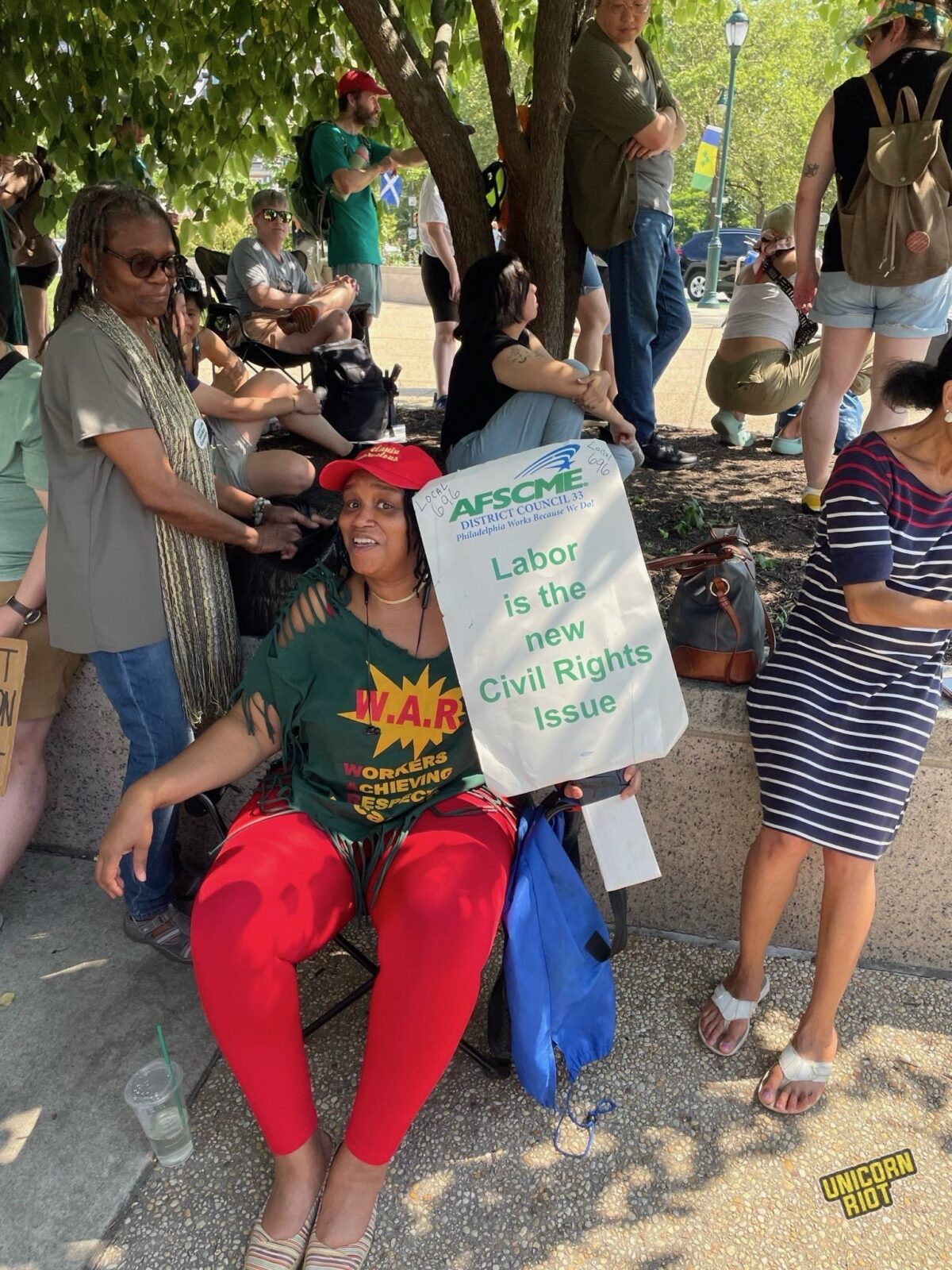
DC 33 Worker: But I do think that long-term, that kind of “every individual decide to show up and vote if you want to” attitude is not gonna be sufficient for building rank-and-file power that can win a strike like this. I’m not confident that the number of people who show up and vote at all – ‘Yes’ or ‘No’ – will be any kind of majority of the union. If you get a minority of the union to show up and vote ‘No’ and that ‘No’ vote wins, that doesn’t mean that the power is there to execute a second strike.
There’s a good chance that the people who decide to show up in person to the union hall and vote at all will be the kind of people who want to vote ‘No.’ But I’m not sure what that will mean for the negotiation table that Greg Boulware and the [DC 33 Executive Board] will be returning to.
UR: Does a ‘No’ vote automatically mean the strike is back on?
DC 33 Worker: No. Just because there’s a ‘No’ vote, it doesn’t mean we go back on strike. Our strike vote that authorized the strike we just had is still in play. We wouldn’t have to re-authorize a strike. But just because we say no to this contract doesn’t automatically mean we will be on strike, in the same way that anytime they’re in the negotiating room, it doesn’t mean we are automatically on strike.
The union [leadership] would still have to authorize the second strike. [If they did], that forces everyone back to the negotiating table. And maybe the threat of striking again is something that’s in play. Certainly the membership would have a couple more paychecks to get us through – I’m at work right now getting paid – and by then I don’t think the entire backlog of problems on the streets, with all the streetlights out, will be cleaned up.
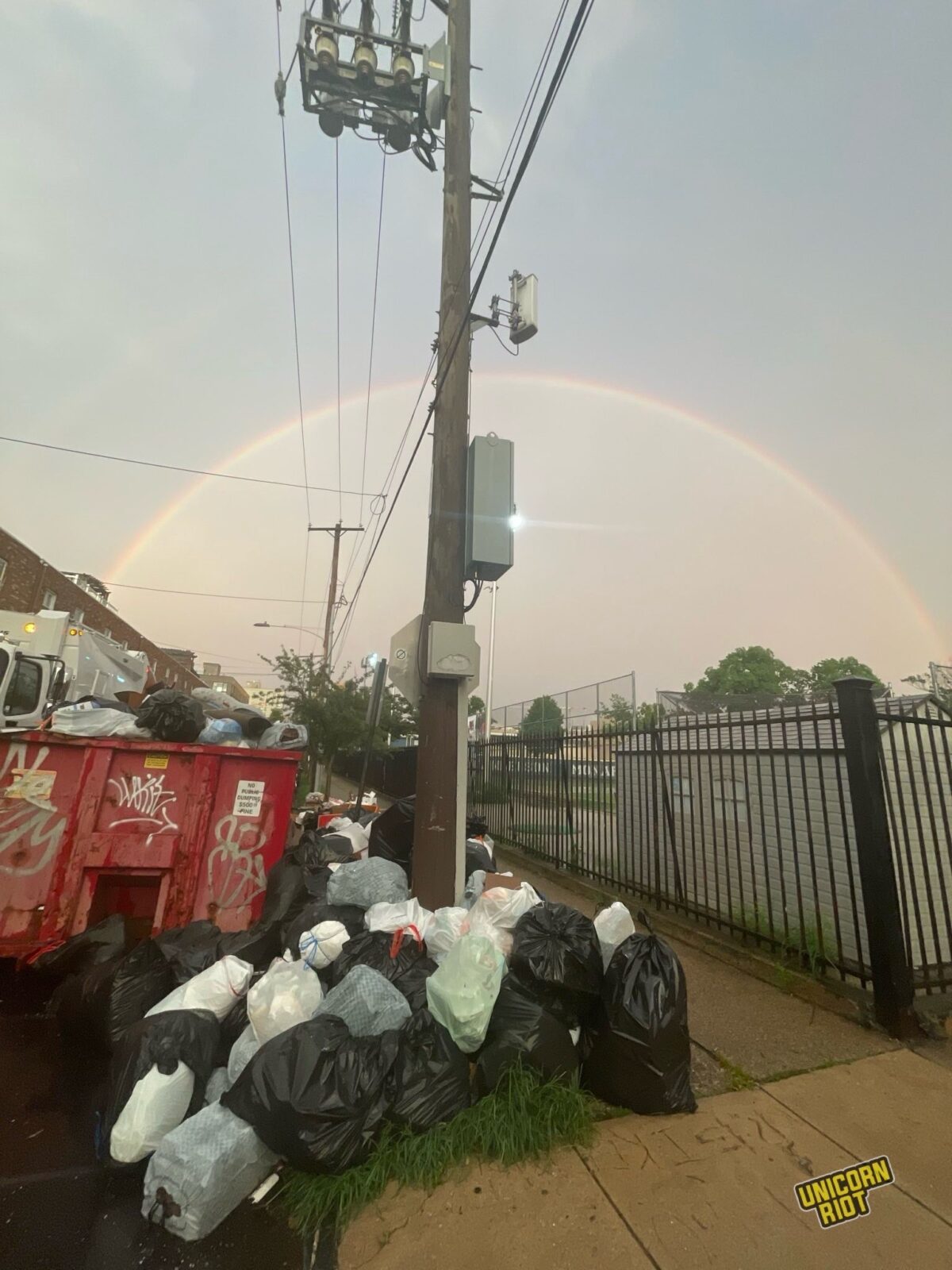
DC 33 Worker: So it’s not like we’ll be starting from scratch. It really depends on who shows up to vote, but if a low enough percentage of people show up to vote, that goes to show that people are probably not gonna be ready to strike a second time.
That’s all hypothetical. I personally think what will happen is a smaller percentage of the union will show up to vote, and those folks will be close to a ‘No’ if not definitely a ‘No.’ And that’ll be that and they’ll have to go back [to the table], but the leverage in that situation is a little unclear compared to the last time, other than the Mayor having the option to say, “OK, I have to give DC 33 something that the membership will ratify.” It’s not clear what those concessions would look like.
We might have gotten all that we can get. I personally think we could’ve struck longer and it would be a different situation.
UR: You said that DC 33 President Greg Boulware probably got the best deal possible given the circumstances. Philadelphia Mayor Cherelle Parker used the judiciary to essentially nullify workers’ right to strike by asking judges to order the water department and the 911 dispatchers back to work really quickly. And then after 8 days, bringing the sanitation workers back with an injunction, or the threat of it, seemed to act as leverage for the city to use to stop the strike, which is a pretty stark contrast to the last strike in 1986 where it took 20 days for the city to bring that injunction.
UR: Can the union use the law to defend the right to strike? It seemed like they were stuck between a rock and a hard place, overpowered by the local judiciary. Do you have any insight into all that?
DC 33 Worker:
I don’t think that there is a legal framework to have rebuffed those [injunctions] in the course they ended up in, but I don’t understand why they didn’t have more of a plan for preempting and responding to those injunctions when they happened.
It’s true that once we strike, the injunctions are coming. It’s also true that, well, it’s not like I show up to work having been injunctioned ready to pick up maggots off the street doing my best job with a historically gigantic backlog, you know. Even injunctioned workers can do work slowdowns. There’s still all these levers that are available. Even if certain people get injunctioned, there’s still plenty of ways to continue to strike. Most unions that strike at this point are not doing true work stoppage strikes the way that we did, so there is a whole playbook there.
I think the fact that they were not prepared with a game plan for those injunctions speaks to how ill-prepared they were to strike.
Given the circumstances, they maybe did get the best contract they could. But the circumstances were that they started planning for that strike a week before it happened. I know this as a rank-and-file member who was ready to step up and strike. I had been asking for six months, “can we please start making a plan for these pickets in case we need them?” and I did not get the go-ahead or the assignment that I even would be a strike captain, or where my location would be, until the Thursday before the Tuesday that we struck.
So if there’s a criticism of the union, I hesitate to locate it in the negotiation room. A lot of newer folks have found it really difficult to get any information or to participate at all. I’ve been really blocked in a lot of ways in my local.
I think it means something that the Presidents on the [DC 33 Executive Board] who did try to vote ‘No’ on this contract are the Presidents of the locals that have larger participation and have been planning for this for months and were ready to go last year when we almost struck. It’s not a coincidence that the [DC 33 local] Presidents who voted to stop the strike were the ones who didn’t prep for it in any meaningful way.
That’s why I feel that under the circumstances, it was an excellent strike for having been kinda seat of the pants. I’m not sure that they could’ve gotten more given the circumstances.
UR: I did see in an interview with DC 33 President Greg Boulware that he said the Water Department injunction came out like 30 seconds after the call to strike. It seemed that the Mayor’s administration was already prepared and aligned, coordinated with the local judiciary to get that out right away?
DC 33 Worker: Yeah, and [DC 33] should’ve internally had a contingency plan for that. When we started talking about striking a year ago, there should’ve been a plan for “OK, when the injunction happens, how do we behave?” If you had a base of strikers trying to strike, who understood how to respond to those situations that were basically inevitable (even in ’86 they did get an injunction eventually), you have to have a plan for what to do when that happens. It’s obvious that there’s gonna be some injunction at some point. The plan couldn’t have been to just fold as soon as it happened and let the Mayor dictate the timeline for that.
UR: Another union member shared an image from the city that seemed to say shouting at scabs wasn’t allowed, as part of the injunction?
DC 33 Worker: Yeah, I saw that image too. They sent it out, but I simply disagree, and luckily I am in a union. So if they try any kind of disciplinary action towards the strikers, I mean, I know a girl who threw a hot bowl of soup at her boss and she didn’t get fired. Obviously striking is different and there’s political reasons to come after us, but I’m pretty confident I’ll be OK.
DC 33 is really good at this 1980s to early 2000s union mindset of “holding onto what we’ve got.” That includes not letting anybody get fired – we will not let ANYONE get fired. They’re very good at holding onto shops that are organized, but they’re not necessarily noticing when things get contracted out to nonprofits or whatever.
That post-Reagan defensive mindset was necessary to survive the general dismantling of organized labor in this country. One new thing we’ve learned in the last months is that now there is energy for a more offensive approach.
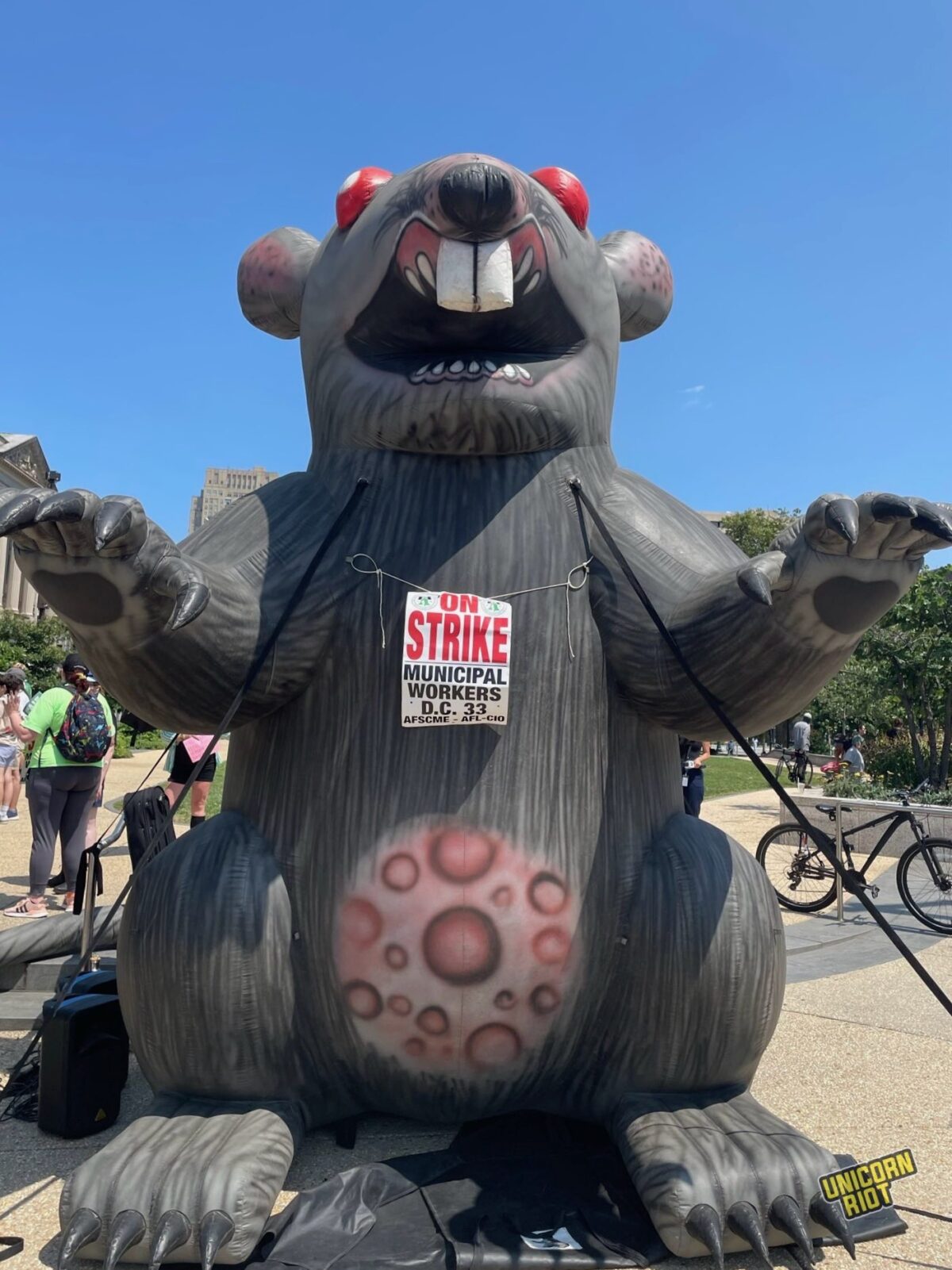
UR: It seemed that, at least in the beginning, there were a lot of things outside the scope of what would be legally tolerated in a strike, people kind of pushing the envelope on their own, not under union guidance, working to hold the line at pickets in whatever way they could.
DC 33 Worker: Totally. And I think that’s a really beautiful thing about this strike. Even though it has gone the way it has gone, what we need in the labor movement is these big swings for the fences. And even if it means that when we threaten to strike next contract, both sides have a clear idea of what kind of power was available this time, there is something nice about knowing just what that looks like when we make decisions going forward. I hope that it doesn’t cause us to be more conservative in the future towards striking.
UR: There’s a lot of militancy in the origin story of the AFSCME chapter in Philadelphia starting with 222 and then eventually, after the huge garbage riots in 1938, DC 33 later became formalized. Do you see any parallels between past and present Philly garbage strikes?
DC 33 Worker: It’s complex. I wish it was a little bit simpler. I also wish that [union leadership] would’ve communicated to us that it was hitting the fan [in negotiations with the city] the night before it did.
There are plenty of escalations that members would’ve been willing to take on as it was hitting the fan, had they communicated that to us in any way. Not that we wanted them to come out and say “hey, it’s going really badly” and demoralize everybody. But there’s a way to say, “hey, here’s how it’s going in there, let’s ramp up a little.”
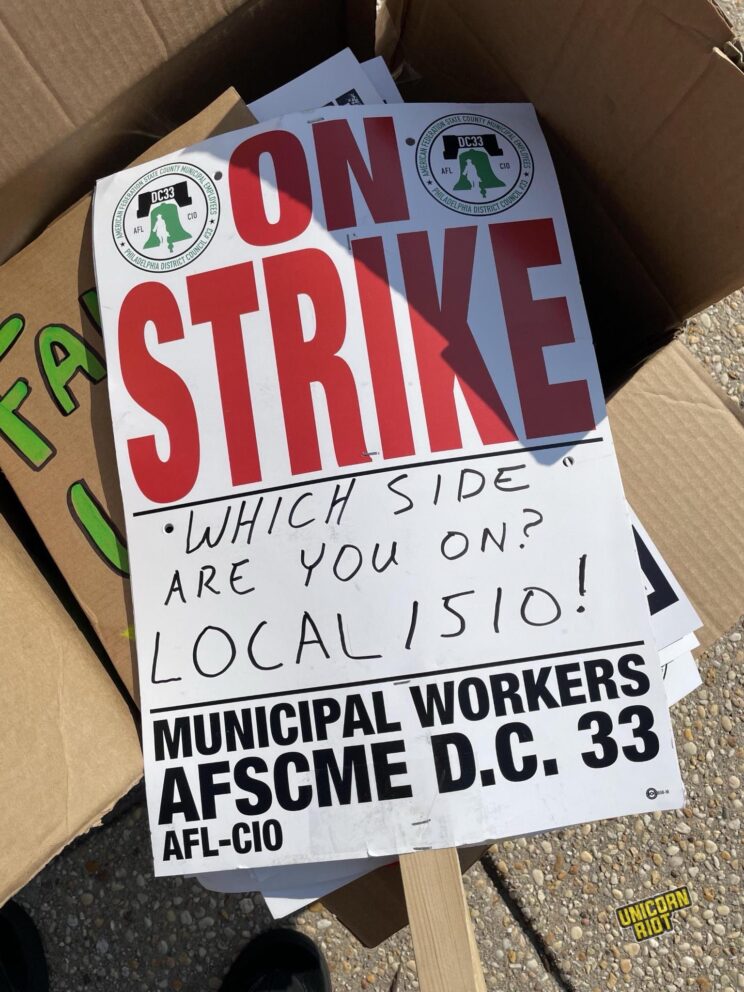
DC 33 Worker: This is my last thought about all this: when we had our strike captains meeting a couple weeks before the strike, they brought in a guy and they said this guy was working for DC 33 last time that we struck, in ’86, and he’s been holding out on retiring because he knows we’re due for a strike again.
He was so cool to hear from. It really did ground the whole room in what we were about to do. And if in the next 10 years they wanna strike again, they now have thousands and thousands of people who can play the role that that man played. The fact that people know what it’s like and know how to do it and know what brand of megaphone they wanna have and how to set up a tent in two minutes flat, that’s the kind of stuff that you only learn by doing it. That’s why I hope that this doesn’t cause a pendulum to swing where they’re much less likely to strike for another 50 years, because it’s so rare to have a union that has this many people with eight days’ strike experience.
He said something along the lines of, “I didn’t retire until this moment because I wanted to strike again” and that he had a positive experience of it. This meant we were all going into it not feeling like, “aw man, now we have to strike…” but rather, “hey, now is this moment that you get to exert power that you hold every day, but you very rarely get to make visible.” It amped people up that he had struck and had a positive attitude towards the idea of doing it again. I feel excited that there are now thousands of people who have that same experience.
from Unicorn Riot
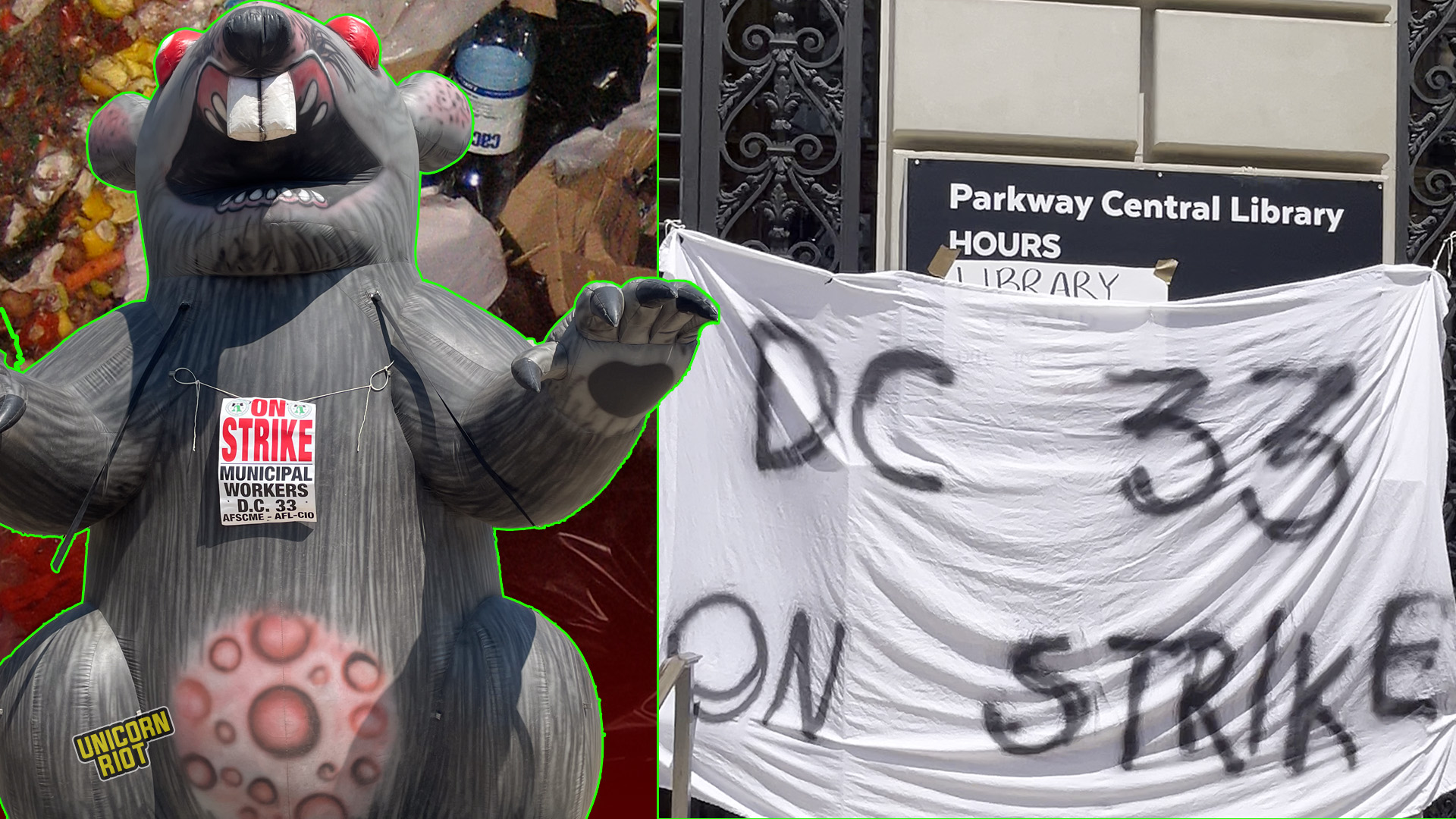
Philadelphia, PA — A working class uprising continued through Fourth of July celebration week in the “poorest big city” in the United States. Jammed locks at health centers, opened fire hydrants, slashed tires, blocked trucks, and blocked access to work sites were just a few allegations brought by City Solicitor Renee Garcia in a recent press conference. Three injunctions have been filed that require a limited number of essential workers to return to work and a third aims to stop “unlawful activity” by union members who are striking for better pay and benefits. Despite court orders, the city had received numerous reports of noncompliance, according to Garcia, “and they have not stopped.”
“At one location where we had employees locked inside, [striking workers] shut off the water from the outside and then parked their car over the valve [to prevent it being turned back on]. It’s not legal activity… Just two hours ago, they breached the fence, they came in and started taking trash from dumpsters and compactors and throwing it on the floor.”
Philadelphia City Solicitor Renee Garcia, July 2, 2025
Meanwhile, trash continues to pile up around the city.
Failed contract negotiations have led nearly 10,000 members of AFSCME District Council 33 (DC33), the union representing blue-collar Philadelphia city workers, to walk off the job.
DC33 represents an array of city service workers including librarians, sanitation, the water department, 911 emergency dispatch, school crossing guards, airport maintenance, and street maintenance.
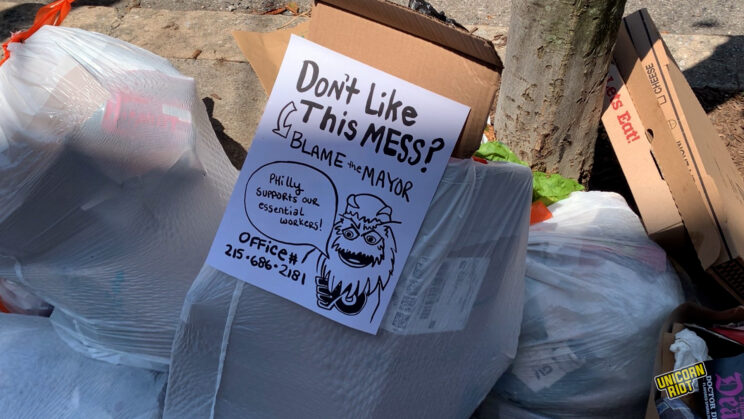
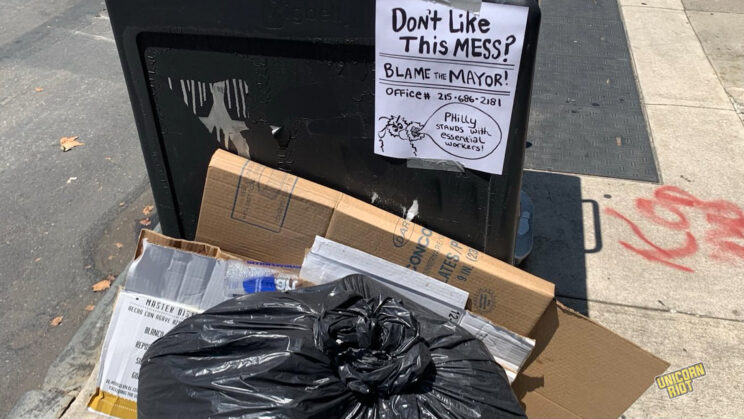
The historic strike by the largest working-class municipal union in Philly is the first of its kind in nearly 40 years. Trash pick-ups, street repairs, and other city services ground to a halt overnight.
Picket lines have been active throughout the city since July 1. Sanitation sites and public libraries have reportedly been chained and locked to prevent scabs – non-union workers brought in to replace strikers – from breaking union picket lines. The official Free Library of Philadelphia website listed over forty locations closed with “work stoppage” as the reason.
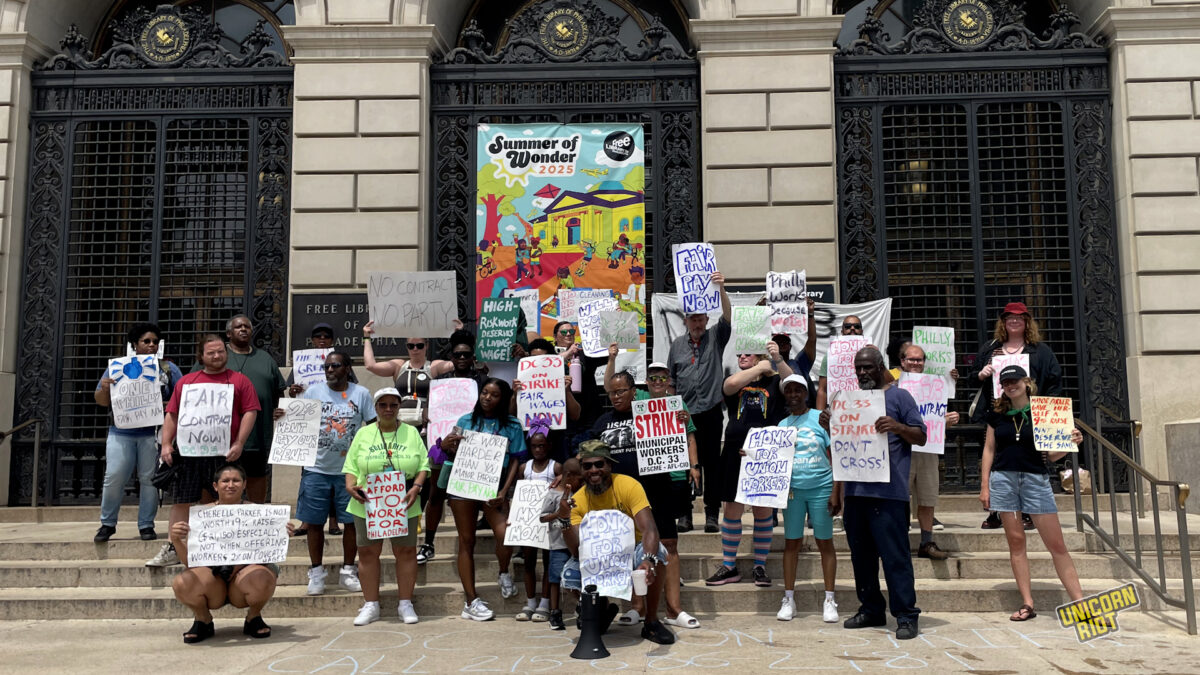
Video from NBC10 shows a tense moment from Tuesday, July 1 when management at the Department of Sanitation in the Strawberry Mansion neighborhood tried to enter the Sanitation Convenience Center while union members confront the person. “We’re on strike, man, you know the rules. We not moving nothing… and that’s what it is. Respectfully…” The clash lasted a few moments before management was turned away and picketers locked the gate shut. “Tell that to the Mayor. It’s the Mayor’s fault, not ours. We’re on strike… and that’s what we’re gonna do until we get a fair contract.”
In a conjuring of C.L.R James’ notion of “proletarian self-activity,” workers throughout the city have taken matters into their own hands, leading to at least two arrests.
On the 3900 block of Ford Road, union worker Carnell Wilder, 59, was arrested in connection to an incident involving a Philadelphia Gas Works employee. Wilder allegedly approached the PGW worker, who was operating a digger loader and asked “why aren’t you striking?” before proceeding to deflate one of the tires with a knife, according to unverified police claims reported in corporate media. Wilder was arrested and transported to a medical center for hand injuries.
The following day, July 2, Jeanette Coppinger, a librarian assistant and union member, was arrested after allegedly blocking the entrance to the Northeast Regional Library on Cottman Avenue. Local news reported that a sheriff’s deputy read the injunction against blocking entry during the picket, but Coppinger refused to move. In court, Coppinger affirmed that she willfully violated the order “to make a statement.”
Even the city medical examiners have walked out. City attorneys complained “cooled storage for dead bodies is getting crowded, and there is a ‘backlog’ of cadavers that need to be examined in Philadelphia’s morgue that has increased due to the strike.”
A judge agreed, “[it] creates a clear and present danger or threat to the health, safety or welfare of the public,” and ordered some staff to “cross any picket lines established by Defendants or any other person if necessary to complete the full, faithful, and proper performance of their duties of employment for the City.”
DC33 is the lowest paid of Philly’s four municipal unions and the only municipal union with majority-Black membership, the Philadelphia Inquirer previously reported. According to a recent report by NBC10, sanitation workers in Philadelphia earn the lowest salary of any major city in the US; they typically earn between $18-20 an hour. A living wage in Philadelphia County for a family with one child stands closer to $38.60, according to MIT’s Living Wage Calculator.
DC33 is currently asking for a 5% increases over each of the next four years; the city offered 2.75%, 3% and again 3% over three years, according to a July 3 Billy Penn report.
On day one of the strike in front of the Parkway Central Library at 1901 Vine Street, one union member carried her child while admonishing the current pay rate as “not enough to even pay for diapers.”
This isn’t the first time Mayor Cherelle Parker, the first Black woman elected mayor of Philadelphia, has faced organized community resistance.
Last year, Parker’s unpopular push to gentrify Chinatown with a 76ers stadium proposal was a disaster for the city, as she spent hundreds of thousands of tax dollars trying to convince her constituents that selling out Chinatown with a new stadium was a good idea. Chinatown residents and their allies rose to “Save Chinatown,” clashing with the mayor at press conferences, city council hearings and outside of City Hall. Despite heroic efforts from the Chinatown community, the stadium deal was approved last December. However, 76ers management reversed their decision with the city, humiliating the Parker administration.
Mayor Parker is again facing backlash after claiming that the city cannot afford the union’s proposal. Video is circulating on social media from 2021, where Parker is seen giving an impassioned speech in support of fair wages for DC33 and even quotes James Baldwin, “I can’t believe what you say, because I see what you do!”
Meanwhile, Parker created 16 new positions within her administration that offer six figure salaries. Parker, herself, enjoys a 9% salary increase that was carried through during the last month of the previous administration. Last year, she received an additional 3.1% Cost of Living Adjustment bringing her salary to $269,708.
Data from the Bureau of Labor Statistics show that garbage collectors are more likely to die on the job than police. Yet, at $64,982, police officers in Philadelphia receive a starting salary of over $20,000 higher than the city’s sanitation workers. This year’s city budget also includes $1.3 million for new police uniforms.
In Philly, the average sanitation worker makes between $39,000-42,000/year. A 5% increase, the union’s current demand, would bring that number up by about $2,100/year, on average. As negotiations continue, the Mayor demanded that “we must restore order before bargaining.” DC33 responded: “Order isn’t the issue—poverty pay is.”
No deal was on the table by the time July 4 approached, where the Wawa convenience store chain hosts its annual music festival celebration called Made in America.
In solidarity with the workers, LL Cool J announced that he would no longer be headlining the Fourth of July event. “I understand there’s a lot going on in Philadelphia right now, and you know, I never, ever, ever want to disappoint my fans, and especially in Philadelphia,” he said in a video on social media. “Y’all mean too much to me, but there’s absolutely no way that I could perform, cross a picket line and pick up money when I know that people are out there fighting for a living wage. I’m not doing that, you know?”
At 2 p.m., the union organized a picket line directly outside of the festival’s entrance, near the Free Library on 1901 Parkway. Scabby – a cartoonish inflatable rat used to shame union-busting employers – made an appearance while hundreds of picketers and their supporters gathered. Union members, a labor historian and even a small band playing old union hymns shared time on the mic.
PHILADELPHIA – #DC33 Strike Day 4:
SCABBY THE RAT joins striking @afscme33 workers (garbage collectors, water plant operators, etc) & supporters picketing Wawa’s ‘Welcome America’ July 4 party.
Mayor Cherelle Parker has yet to agree to striker’s demands for livable pay. pic.twitter.com/tOKTgBblqn
— UNICORN RIOT (@UR_Ninja) July 4, 2025
By around 3:20 p.m., another performer and Philly native, Jazmine Sullivan, expressed her solidarity with the workers and refused to cross the picket line to perform. Her Instagram story read, “In this life we are only measured by how we uphold our morals and standards, by what we choose to fight for through participation or protest. Today I choose not to perform at the Wawa Welcome America concert and stand with Philly’s DC33 until the city and union find a way to bring fair living wages to our working class. I love my city and I believe in you. Hopefully we will get to celebrate when things are better.”
As uncollected trash keeps piling up, strikers with @afscme33 are encouraging supporters to keep contacting Cherelle Parker’s office to help apply pressure to agree to an 8 percent raise for garbage collectors & other essential workers who often struggle to make ends meet. pic.twitter.com/TL3KHdcA0U
— UNICORN RIOT (@UR_Ninja) July 4, 2025
The historical significance of a sanitation worker strike in the U.S. cannot be overstated. The 1,300-strong sanitation strike in Memphis, Tennessee, inspired Martin Luther King to give his 1968, “I’ve Been to the Mountaintop” speech. “Don’t let anybody tell you to go back on the job and paternalistically say, ‘Now, you are my men and I’m going to do the right thing for you. Just come on back on the job.’ Don’t go back on the job until the demands are met. Never forget that freedom is not something that is voluntarily given by the oppressor. It is something that must be demanded by the oppressed.”
“The person who picks up our garbage, in the final analysis, is as significant as the physician, for if he doesn’t do his job, diseases are rampant. All labor has dignity.”
Martin Luther King Jr., March 18, 1968
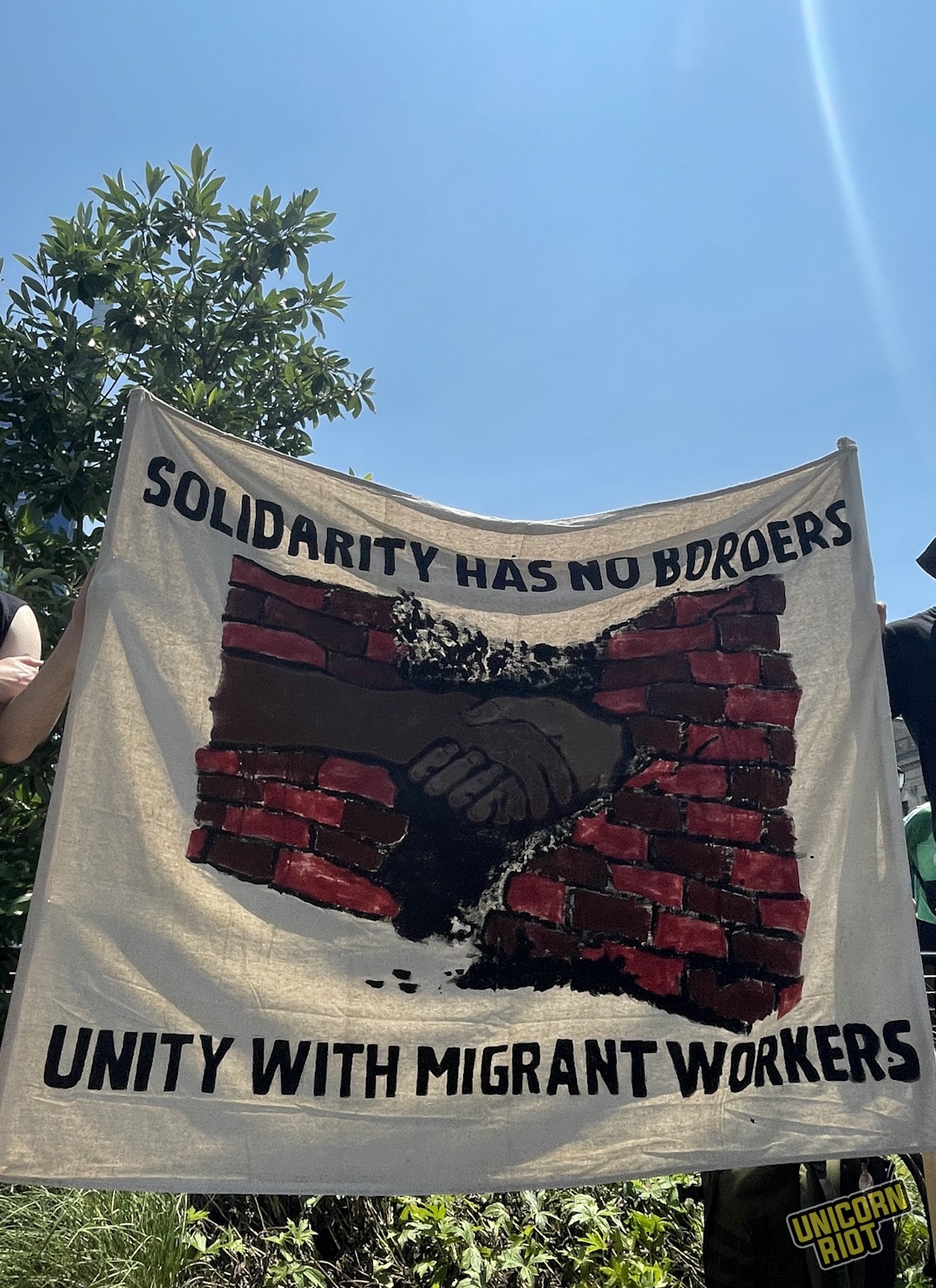
Standing with members of the sanitation unit on July 6, Greg Boulware, president of AFSCME DC33, strengthened the resolve of the strikers.
“We see scales, charts and graphs all over the country that are highlighting how far below the men and women who work in the City of Philadelphia are living below the living wage scale. That has to change … I don’t care how many SCABS they get to try to do our work, they can’t do the work that District Council 33 does.”
Greg Boulware, President, AFSCME District Council 33
On Monday, July 7 – the seventh day of the strike – three activists from the environmentalist Sunrise Movement had a “Special Delivery” for Mayor Parker. Inside City Hall, overflowing trash bags were dragged in front of room 185. The bags carried a written message, “MEET DC33 DEMANDS.” A sit-in had begun.
According to a Sunrise Movement Instagram post, “we picked up garbage from Piccoli Playground in North Philly, one of the mayor’s temporary dumpsites where trash continues to pile up and put us at risk.” The three were quickly arrested. One yelled, “Workers deserve dignity! Cherelle, pay your workers!” All three were released later that evening.
The same morning, in the Point Breeze section of South Philadelphia, striking workers reported a large police presence outside of Queens Memorial Library. One union member said that no scabs had been able to cross the picket. “SCAB LINE” was written in chalk at the library’s entrance. “WE SEE YOU SCABS – WE REMEMBER” was chalked in large letters on an adjacent wall. As of July 7th, the Philadelphia Free Library website listed 48 library locations closed due to “union work stoppage.”
Whispers of a city-wide general strike loom as other work sectors experience labor disputes. ASFCME DC47 plans for a strike authorization vote on Thursday, which would add 3,000 more strike-ready workers.
World Café Live is striking for union recognition (organizing with IATSE Local 8). The Philadelphia Federation of Teachers has voted to authorize a strike if they don’t come to a new contract agreement before their current one expires in August.
Penn Museum Workers United AFSCME Local 397, who voted to strike this Wednesday, went to social media to express solidarity with DC33: “The working people of Philadelphia deserve more than the crumbs Mayor Parker and Penn are putting on the table.”
As the workers maintain their resolve with “One day longer, one day stronger,” Philadelphians continue to defy the Mayor’s orders to not put trash on the curb. Block by block, signs and notes are shared between neighbors expressing support for the striking sanitation workers. In the City of Brotherly Love, solidarity remains a love language for strike summer 2025.
Learn more about the local history of sanitation strikes from Michaela Althouse in the Philly Voice: Philly’s history of city worker strikes included Molotov cocktails, suburban weddings and 45,000 tons of garbage
Cover images by R. Martin. Garbage background via Perez Partensky, Wikimedia Commons. Composition by Dan Feidt.
from Instagram
Please join us in celebrating Local 8’s legacy of militant unionism and build connections with our local IWW branch.
**Date:** June 21st
**Time:** Noon
**Location:** Spruce Street Harbor Park
We must remember Local 8 and Ben Fletcher because he is a hero the Philadelphian working class created and his memory is still a threat to power, oppression, racism, and greed. As politicians and the owning class continue to ignore our needs and attack our right to organize, it’s important to understand the origins of racial segregation and systemic racism as part of the system that is still with us and that we must actively combat.
As an international, multi-racial, and gender inclusive union that has been around for over a hundred years, our struggle continues today. We organize workplaces to improve our material conditions and help others trying to build democracy in their workplaces too.
Let this historical marker stand as a commemoration to Fellow Workers, both past and present, and a reaffirmation of our need to organize as a working class to abolish the wage system. We reject electoral politics and vote begging as a means of improving our material conditions and instead, we recognize that the solution to our suffering lies with each other. We welcome all who want to organize and strengthen the labor movement, so we can grip industries through militant working class solidarity and win demands.
Thank you and shout out to @gemolteni for the poster designs!
from The Conversation
On a late summer day in 1906, a small group of newly arrived Jewish immigrants in Philadelphia took a streetcar across town to Fairmount Park. Several miles from the cramped row houses and oppressive sweatshops of the immigrant quarter of South Philly, the neighborhood now known as Queen Village, they enjoyed a sunny picnic.
They weren’t there to make small talk, though.
Instead, they wanted to write “revolutionary articles” that would spark the “struggle against all that degrades and oppresses humanity,” as one of the leaders of the group, Joseph Cohen, later wrote in his 1945 memoir.
More specifically, the picnicgoers wanted to start a newspaper. It would be titled Broyt un Frayheyt – Yiddish for Bread and Freedom – the anarchist reminder that to live the good life, one needs both.
I’m a professor of media and politics at Temple University in Philadelphia. For the past year I’ve been tracking the life and times of my great-grandfather Max, a radical Yiddish journalist in the early years of the 20th century.
To my surprise, I found he had lived here in Philadelphia, and his story is part of a largely forgotten moment in U.S. history: when Philly was an epicenter of the national anarchist movement, heartily supported by the city’s burgeoning Jewish immigrant community.
By 1906, thousands of people like Max had made their way to Philadelphia from the Russian “pale” – the only part of the Russian Empire where they could legally reside. They fled economic isolation and state-sanctioned persecution in search of a more stable life.
South Philly was better than where they had come from, but immigrant life then, as now, was by no means easy. They had escaped a legal regime of oppression and the perpetual threat of antisemitic mob violence. But in turn they found a world of dark alleys and dead ends. Their labor was exploited, their living conditions meager.
For some, the American promise of freedom and prosperity seemed to ring hollow.
They did, however, find one freedom they had not experienced before. They were able to speak, write and publish their ideas no matter how outlandish or against the grain.
And they could do so in Yiddish, the vernacular of daily life but a language of exile – one that in the old world had often been outlawed in print.
The Yiddish press in the United States was experiencing extraordinary growth at the time. In New York, Philadelphia and other cities, newspapers quickly emerged – and often disappeared – month over month.
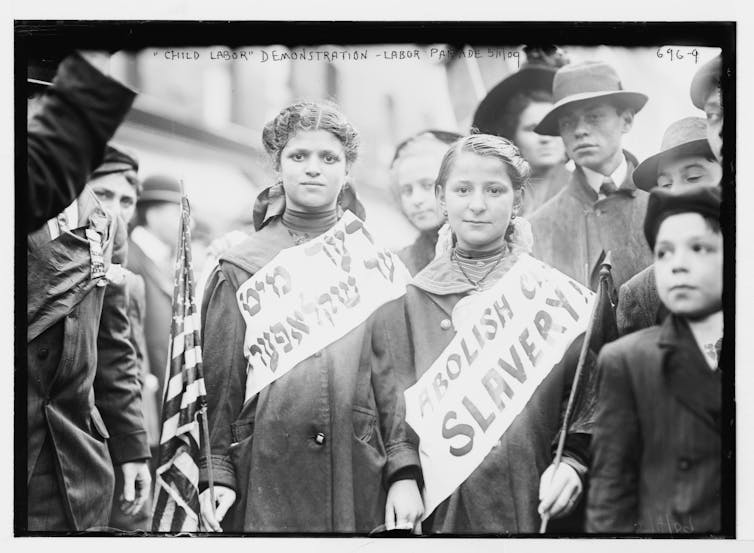
Max moved to Philadelphia in 1906 to work with another immigrant named Joseph Cohen. Cohen had arrived in Philadelphia three years earlier. He earned a scant living making cigars, but his real work was advocating anarchism.
At the dawn of the 20th century, anarchism was not the nihilistic chaos the term may bring to mind today. It was a heartfelt dream of a free and egalitarian society.
The anarchists believed that man-made hierarchies – political, economic and religious – were illegitimate and limited the full expression of humanity. They rejected the authority of the state. That particularly appealed to many Jewish immigrants, for whom laws in the old country had long served as vehicles of oppression.
Cohen had studied this philosophy of local autonomy and communal life with the Philadelphia activist Voltairine de Cleyre.
History may remember Emma Goldman, a Lithuanian-born New Yorker and perhaps the leading voice of American anarchism from that era. But de Cleyre was the heart and soul of Philadelphia’s anarchist scene.
Goldman once described de Cleyre as a “poet-rebel,” a “liberty-loving artist” and “the greatest woman anarchist of America.”
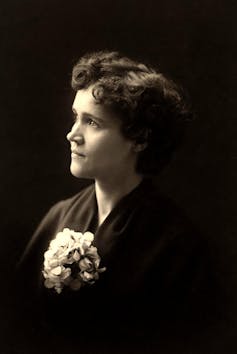
A tireless critic of the inequities of the industrial age, de Cleyre had taught herself Yiddish to better serve as “the apostle of anarchism” in the Jewish ghetto.
While de Cleyre could often be found speaking in front of city hall, Max, Cohen and their colleagues were more likely to gather at the corner of Fifth and South streets, the hub of Philadelphia’s Yiddish press and its culture of rambunctious street debate.
By 1906, Cohen had co-founded the anarchist Radical Library in the upstairs rooms at 229 Pine St. This provided the Philadelphia anarchists a meeting space and reading room.
But “the Jewish newspaper men, the radicals and the tireless talkers,” as the Philadelphia historian Harry Boonin wrote, still congregated in the ramshackle cafes lining the 600 block of South Fifth, where they would argue over anarchism and atheism deep into the night.
Cohen’s goal was to publish a nationally influential anarchist paper that would give voice to the “comrades from Philadelphia.”
That meant direct competition with the New York Yiddish press and the influential weekly newspaper Freie Arbeiter Stimme, or The Free Voice of Labor. Edited by Saul Yanovksy on Manhattan’s Lower East Side, FAS was the center of the Jewish anarchist movement and of the Yiddish intelligentsia more broadly.
“To be able to say ‘I have written for Yanovsky,’” wrote the sociologist Robert Park in 1922, “is a literary passport for a Yiddish writer.”
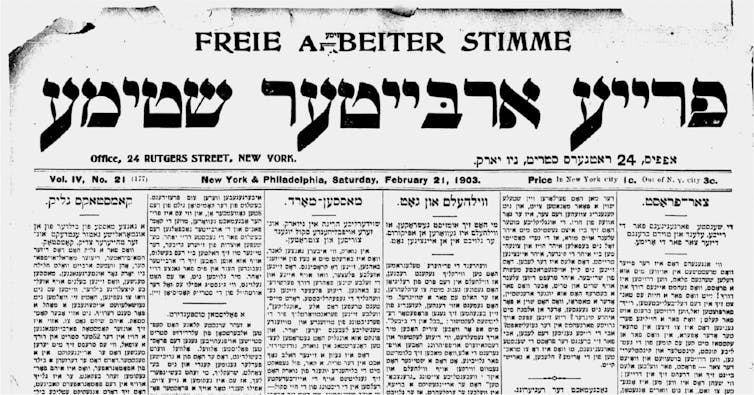
Although the FAS masthead said the paper was located in New York and Philadelphia, Yanovksy controlled the operation from New York, much to Cohen’s dismay.
The Philadelphia anarchists were also routinely disappointed in Yanovsky’s politics. He was too moderate for their tastes. Yanovsky favored organizing labor and voting in elections, while the Bread and Freedom group, according to Cohen, wanted to cultivate “the militancy and fighting spirit which our young comrades brought with them from cold Russia.” They advocated for more aggressive measures to counter “the submissive indifference of the bourgeoisie and the slavish patience of the workers.”
Cohen had partnered with Yanovsky earlier in 1906 to publish a daily anarchist newspaper. He maintained a small office in the back of Finkler’s cigar store at Fifth and Bainbridge streets. But the paper was printed in New York and delivered back to Philadelphia each morning by courier train.
Cohen wrote in his memoir that he suspected Yanovsky intentionally sabotaged the effort by insisting that he personally write the daily editorial, but then turning in his copy too late for the paper to make the train. After two months the partnership, and the paper, fell apart.
For Cohen, the lesson was that to be the genuine voice of the anarchist movement, he had to print the paper locally in Philadelphia.
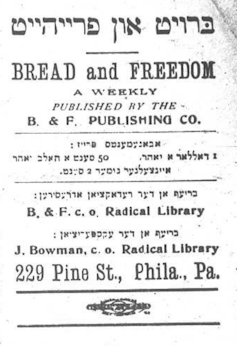
Bread and Freedom published its first issue on Nov. 11, 1906. The date was symbolic. It was the anniversary of the execution of the “Chicago martyrs” – the four men wrongly sentenced to death for the 1886 bombing at a labor rally at Chicago’s Haymarket Square. The Haymarket affair galvanized the anarchist movement among immigrants, even as it accelerated the wider fear of foreign-born radicalism.
Over the next three months, the newspaper offered a weekly digest of anarchist arguments. It translated into Yiddish Voltairine de Cleyre’s critique of capitalism and what she called its “moral bankruptcy” – its hunger for wealth, power and material possessions. It attacked what de Cleyre called the “dominant idea” of the times – “the shameless, merciless” exploitation of the worker, “only to produce heaps and heaps of things – things ugly, things harmful, things useless, and at the best largely unnecessary.”
In the strongest of terms – “bombastic,” in the words of one local historian – the paper echoed de Cleyre’s call for the “restless, active, rebel souls” of immigrant Philadelphia to rise up to oppose the “great and lamentable error” of industrial capitalism.
Almost as soon as it began, however, Bread and Freedom ran out of money. Its rhetoric was exciting but ineffective. The paper offered no real solutions beyond an impossible demand to dismantle the capitalist state.
Although two members of the group were briefly detained by the police in Baltimore for selling a radical newspaper, their fiery propaganda lit no revolutionary spark.
Instead, it disappeared quietly, folding in January 1907.
Even then, a different kind of immigrant was arriving in the U.S. from Russia. Their radical politics were coupled with organizational acumen.
Many of the older anarchists would join forces with these newcomers, and the effort morphed into something more pragmatic. They helped build the foundations of the 20th-century labor movement, which successfully fought for once-radical ideals such as the eight-hour workday and paid sick leave.
Cohen moved to New York and took over as editor of FAS in 1923. That was a tense period for the Jewish left, following the Russian revolution of 1917 and the Communist rise to power. In response, the U.S. government suppressed domestic radicalism, arresting and at times deporting foreign-born leftists, and anarchism fell out of favor.
A few years earlier, though, the streets of South Philly had been home to a vibrant space of free speech and boundless political imagination. It would not last long, but it is a moment I believe is worth remembering.
From Workers Solidarity Alliance, Labor Committee.
Revolutionary unionists have always stood for the solidarity of the global working class, rejecting every attempt by the ruling class to divide us—whether through borders, race, gender, or any other means of exploitation. The idea that workers in any one country have interests in common with their bosses is a lie designed to keep us from recognizing our true power. The recent trade war policies of the fascist U.S. President Trump, which sought to pit U.S. workers against workers in other nations through tariffs, were just one example of how those in power manipulate workers for their own gain. When ruling classes in other countries retaliate, it is nothing more than a struggle between competing capitalists—none of whom serve the interests of the working class. Meanwhile, their economic and political systems continue to brutalize migrant workers, exploit marginalized laborers, and uphold structures of oppression that harm all but the wealthiest few.
Any attempt to rally workers behind protectionist policies—whether by right-wing nationalists or union bureaucrats like United Auto Workers President Shawn Fain—is a betrayal of true working-class solidarity, operating within a system that assumes the permanence of exploitation, seeking only to negotiate for slightly better conditions rather than challenging the system itself. It is no surprise, then, that they accept the logic of capitalist competition, framing economic struggles as battles between nations rather than between workers and bosses. If our unions are led by those willing to collaborate with the ruling class, then workers must build new structures of power—organizing outside the limits imposed by hierarchical union leadership and embracing direct action, mutual aid, and truly democratic decision-making in our workplaces, communities, and beyond.
At the same time, we reject the myth of “free trade” as a benevolent force. For centuries, imperialist powers—including the U.S., Russia, and China today—have used it as an ideological cover for the exploitation and plunder of workers in smaller, less powerful nations. The wealth hoarded by the ruling classes of imperialist nations is stolen from the labor and resources of the Global South, just as capitalism itself is built on the theft of Indigenous land, the unpaid labor of enslaved people, and the continued oppression of marginalized communities. Some workers in the imperial core may receive small material benefits from this exploitation, but we reject any suggestion that this justifies their complicity. The labor movement must refuse to be a tool of capitalist expansion, and those who try to convince workers that they share a common cause with their bosses—whether through nationalism or reformism—are enemies of true workers’ liberation.
Rather than being trapped in the false choice between “free trade” and protectionism, workers must demand a new world—one where resources and wealth are shared equitably, and decisions about production and distribution are made democratically by those most affected. A movement for workers’ liberation must be rooted in feminism, anti-racism, disability justice, environmental justice, and the struggle against all forms of oppression. Only through solidarity that recognizes the full humanity of all workers—across borders, genders, and identities—can we create a future beyond capitalism, where our labor serves our communities, not the profits of the ruling class.
By Philly Metro and Greater Chicago WSA
Among many reports and conversations at our November 40th Anniversary Congress, two that stand out are a renewed excitement about working-class journalism, and how our WSA Branches are trying to orient our work to our worksites and co-workers.
What this has meant in these early days of the Trump-Musk Attacks?
We can’t speak for all WSA members, but many of us have felt depressed and in shock, aware that our families are directly vulnerable.
In contrast to 2016, where the resistance to Trump was immediately galvanizing, there has been a cultural sea-change. We certainly feel part of this ‘just-getting-on-our-feet-now’ period.
Speaking for only some in our branches, these early months have felt like a tornado watch. We keep looking out our window to see how close the danger is. There has been a noticeable pause on our public national level projects as this Trump-Musk attack is unfolding, but as we write this, we are getting back to our work!
As regards our worksites, one of the immediate responses has been to the scapegoating ICE raids some of our most at-risk families have been living in terror at the haphazard nature of these assaults.
We’ve been actively working on connecting our coworkers with community organizations, putting out flyers with contact info for immigrant rights hotlines, helping with outreach for multilingual trainings.
Locally, we’ve also been helping to organize an upcoming protest in coalition with local activists. While we are not reformists, we bring our workforce concerns and syndicalist analysis as best we can, trying to build momentum for any public opportunity to say “NO!” to this time of crisis.
As anarcha-syndicalists we are clear as daylight that we use the word ‘democracy’ to mean not bourgeois democracy where the competing elites vie for our votes to get power. We will resist Trump and Musk, but this does not mean we were signed up to support what would have been a Biden-Harris regime of business as usual and genocide. We are clear that by standing up for democracy we mean a worker’s democracy, and the classless, non-hierarchical society which alone can make the word ‘democracy’ meaningful. But right now we are focusing on our commonality with at-risk co-workers and others, with Trump voters who suddenly realize their jobs & benefits are now in jeopardy.
While we are few and our branches are small, it feels the best way for us to cope is to stay engaged. While we’ve been slow to get back to journalism, it’s time to do just that. Members are saying it’s time for us to have our WSA National Labor Committee soon, and we will!
As a way back to working-class journalism, today during work hours we did what we meant to do, which was to talk with WSA members and comrades, and try to get their thoughts into print.
As a start today, at 10 am, while on the clock, we talked on the phone with our comrade Greg Mcgee:
“What we should do is have a dialogue with our fellow workers, but make sure we use facts. Use radical websites talking about Russian deserters and Ukrainian deserters refusing to fight. Imagine together if they called the soldiers and no one showed up! The wars would stop.”
“With all this rampant fascist nationalism happening now, the bigotry, anti-semitism, racism, right now, imagine replacing the word “immigrant” with “Jew”, and discuss the fascist past. We know that Mussolini and General Franco were fascists, we really don’t know what Trump and Musk are. LThey may just be narcissists, but I think we need to draw our fellow workers’ attention to the historical past of fascism, how this is looking worse and worse. Again, the scapegoat is immigrants right now; remember what happened in Nazi Germany: Right now it is much much less far-fetched thinking it could happen here. We have to remember what happened to Japanese people in the U.S. in WWII, where people were rounded up and put in concentration camps.”
“This is the time for meetings with our fellow workers at our places of employment; this is the time to work on our common ground, the threat that’s facing us now.”
From Lana – by phone during work hours, an hour later:
“It’s so multi-faceted, this outright chainsaw to any social safety nets, and we absolutely know as the economy goes south, we in the working class are first in line for the economic consequences. Isn’t this what we’ve been saying all along? That capitalism is evil because it uses us as fodder in so-called good times, and uses us as frontline fodder in any disaster?
“I think this is the time for us as syndicalists to get on our feet and organize, to get our fellow workers involved as a group from our workplace in community resistance – it’s a wake-up call. Five-alarm fire, let’s get to it !”
###
Philly’s long time organizer and radical journalist will address the WSA’s 40th Anniversary Congress, with reflections on group democracy, journalism and anarcha-feminism! Helping us look to our future!
to attend, write to us at
philly-metro-wsa@proton.me


At three different worksites, WSA members wrote short invitations to take part in solidarity actions for the fight against wage theft; each invitation included an accessible intro to the history of the IWA-AIT. The Invitations were tailor-made to the co workers at each workplace.
One of the invitations read in part:
“Many of us here have been in the US workforce for years, even decades. We’ve had the experience of having a boss not pay us what we were due, or trying to withhold benefits. We’ve heard from our families’ bad experiences, or we’ve had friends or co-workers who’ve had to go through this. Now is an opportunity for each of us in our own work situation to educate ourselves about how to act in solidarity when these situations come up!
“The world’s oldest anarcho-syndicalist international, the IWA-AIT, invites us to be part of an international week of action against unpaid wages, Oct 16- 22. Several of us here are excited to be part of this, and we plan to do a workshop on how we can teach ourselves about this issue, how we can act in solidarity, and how we can be ready to advocate for our friends and family when things happen!”
from Unicorn Riot
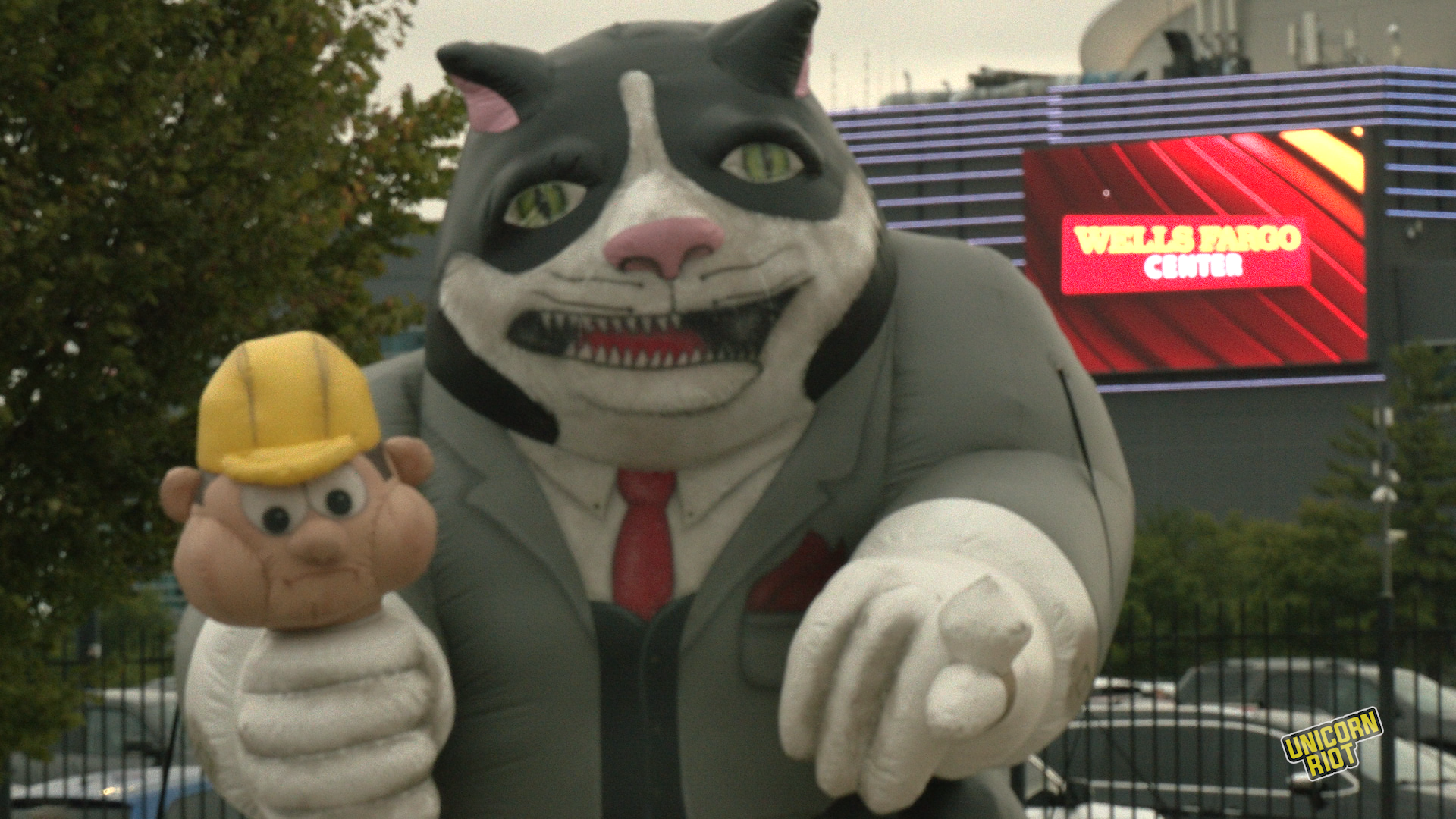
Philadelphia, PA — The unionized workforce that handles concessions at the South Philadelphia Sports Complex started to strike on Monday, September 23. Hundreds of Aramark stadium workers that bargain with the UNITE HERE Philly Local 274 union are demanding new contracts.
Unicorn Riot was told that Aramark, which is headquartered in Center City Philadelphia with a market capitalization value of $9.8 billion, has tried to prevent the unionized workers from qualifying for healthcare plans by dividing their hours between the three stadiums – Citizens Bank Park, Lincoln Financial Field and the Wells Fargo Center. (In a statement to NBC10 Aramark claimed it has now offered to count all stadium hours towards health coverage in a new contract.)
“Our contracts have all expired in all three buildings so we’re trying to consolidate the work. So, three different buildings doing the same job, you get different pay rates now. We want it to be the same pay rate. So if you’re a cook, a cook, a cook [at those locations] you get the same pay. It’s not like that. We want the hours to count from all three buildings to qualify people for health care. Right now they keep the hours separate.”
Kathy Hazel, Aramark concessions worker at Wells Fargo Center for 24+ years
“We might have worked all three buildings in a week, we still get one check from Aramark. But we get three different wages, that’s the issue here. […] They don’t want to agree to benefits like PTO. I understand it’s a ‘part time’ in one building, but when you’re in all three buildings you’re working like full time, you’re getting full time hours… but they’re still trying to treat us as if we are part time.”
Tarell ‘Doe’ Martin, Aramark concessions worker
On Sept. 24, outside a Phillies baseball game, union members called on fans to avoid purchasing food, drink and clothing inside the stadium, to pressure the company to negotiate a better deal. Aramark touts that “total income inclusive of wages and tips for this group of employees have risen 61% over the past five years,” while we heard from the workers that this is disingenuous because the tips have come from the public, not their employer. For an hourly cost of living increase, Aramark offered fifty cents a year, then another ten cents on top of that a year,
Many of the Aramark workers are not tipped at all, so they want to improve their base pay and benefits. “I noticed that they did not thank the Philadelphia fans for helping pay the salaries of their workers,” said picketing union member Kathy Hazel. “They don’t get any credit for any money I get from tips. […] There’s a lot of workers that are not tipped workers. And we’re here to support them, so that the hourly workers get an increase. They’re not getting tips, and we stick together.”
Down the street, independent vendors offered pretzels with notes on their carts saying that Aramark was on strike. Anthony Oliver with the striking Aramark workers pointed out that once again the ‘Counter Terrorism’ unit of the Philadelphia Police has turned up at Aramark labor protests. Forty-five Aramark workers were arrested in June by a force that included the same type of police we saw outside the recent presidential debate with ‘Counter Terrorism’ markings. Outside a Biden fundraiser last December, one officer on that team told Unicorn Riot that they are always deployed to protests but declined to name the specific policy which enables this.
UNITE HERE Philly Local 274 represents about 4000 private sector hotel and food service workers throughout the Philadelphia region, according to their website.
Prison labor is “remarkably common within the food system,” according to the Hunter College New York City Food Policy Center, and Aramark is at the heart of this game: it is notorious for its role in the food side of the prison-industrial complex. Its subsidiary Aramark Correctional Services provides services to hundreds of U.S. prisons and jails, privatized Immigration and Customs Enforcement jails operated by CoreCivic, along with contracts in at least 35 states, according to an investigation by American Friends Service Committee. It has long been notorious for substandard, contaminated and undercooked food.
Aramark investors benefit from prison labor used to prepare and package food in some prisons under the In2Work program. Students at Barnard College, New York University and Ireland’s Trinity College successfully got Aramark campus contracts cancelled. Georgetown University has been another site of pressure against Aramark both because of its prison labor and over on-campus workers’ contract in March.
In its corrections FAQ, Aramark says it’s in this business because “all people deserve healthy, nutritious meals.” A September 2023 Prison Journalism Project report by Justin Slavinski, “Meet the Company Getting Rich Off My Prison’s Awful Food,” described how the “100-or-so” residents in a Florida penitentiary who cook and clean are “wholly unpaid,” slashing Aramark’s labor costs to a small fraction of what legal employees would cost. Jail inmates have pushed for wages, and a prison strike protested Aramark.
This isn’t the only major political issue with the stadiums and sports construction in the city. The 76ers professional basketball team is seeking to move away from the Sports Complex and into Center City in 2031, by demolishing part of the Fashion District mall and building a $1.55 billion new sports arena site called “76Place” which is said to include 395 residential units.
This plan is opposed by many people involved with the Chinatown neighborhood a block away. “Save Chinatown” supporters argue that the 76Place project will displace and damage their neighborhood. Nonetheless, on September 18 first-term mayor Cherelle Parker announced her administration reached an agreement to move the Center City arena forward. On Sept. 25, the mayor announced more details in a community meeting, while further protests are expected.
Earlier this month, we heard from local activists trying to “ban artificial turf installation on city property including parks and recreation centers,” specifically in a huge set of proposed soccer fields at the large FDR Park which is directly west of the Sports Complex. (The FDR Park construction project has attracted opposition and protests since 2022.)
Another corporate giant in the city, Comcast, has its own designs on the Sports Complex. In February, Comcast Spectacor unveiled a $2.5 billion multi-phase master plan. Some observers suspect that Comcast will once again fleece the public coffers and obtain a development subsidy, like the tens of millions it obtained for the construction of their Center City skyscraper, along with tax breaks.
Philadelphia will be hosting six games at an upcoming FIFA World Cup in the Lincoln Financial Center, which runs during June-July 2026. FIFA scandals may have affected Philadelphia’s earlier bid in 2015. The push for this bid started in 2016. The city got up to $10 million in aid for the FIFA event from the state legislature via House Bill 1300 which was signed by Democratic Governor Josh Shapiro on December. In 2021 the city pitched using FDR Park for practice fields; however, as we heard at the PFAS protest, FIFA does not host World Cup games on artificial turf, so all 2026 matches will need to be on natural grass.
Coworkers, comrades, and fellow labor activists—wishing you a restful Labor Day weekend!
In keeping with our radical political traditions, we put our activist energies into May Day, not Labor Day. This doesn’t mean that we haven’t been craving a rest from the bone-aching grind of our labor. In our WSA branch, we are furniture movers, home workers, pink collar assistants, and healthcare workers. We all need a rest from exhaustion. This three day weekend is needed to recover.
Labor Day was fought for and won by workers. But we also know that this is far from enough. It’s a drop in the bucket.
Labor Day, with its parades and picnics, took the shape of a more capitalism-friendly alternative to the more radical May Day that was characterized by street protests and strikes.
While we focus our eyes on May Day, you will still see us with friends at local Labor Day events, re-affirming the community aspects of our work lives. We need to recuperate in preparation for amplifying workplace voices and building relationships. As we know, building relationships is the heart of organizing. So, strike up the grill. But tomorrow, we build the General Strike !
From Philly Metro WSA
“We are committed to building a future rooted in a classless and stateless society, where we, as working people, create workplace and community democracies that prioritize human needs over profits for the few. Our vision is a world free from the social oppressions of racism, sexism, and queerphobia. Through our revolutionary unions, we will transform the nature of work, paving the way to our collective liberation.”
From Greater Chicago WSA
from Instagram


By Greater Chicago WSA
Reprinted from WSA Discussion Bulletin # 75
1
Wednesday, May first, at 8 30 pm EDT, workers from around the country and Canada gathered for our third annual May Day online event.
The recent passing of our beloved Clarissa, who was pivotal in the first two years of our evening May Day, was frequently mentioned through the gathering.
The opening song, by Martin Traphagen, ‘Arrival,’ was inspired by Clarissa.
The third annual May Day Speech, this year delivered by Rebecca Croog, vividly described the impact that Clarissa had on her work: “As I find my way into this work, I am visited multiple times a day by the memory and spirit of our Comrade Clarissa, who we recently lost to long covid. I can hear her encouraging us:
‘Don’t mourn, organize!’ I can feel her galvanizing us: ‘Let’s build coalitions! Let’s make this moment bigger and bigger!’ Gathered together as an anarcha-syndicalist community, let’s invite her in to remind us: ‘ALL BUILDS TO THE GENERAL STRIKE’
Rest in power, Clarissa! Free Palestine!”
As attendance increased, speakers reported on recent health care labor struggles, and one of the founding members of WSA, Steve Rabinowitz, read from the history of the Haymarket Martyrs, specifically the words of August Spies.
After the formal program, attendees shared news of May Day events and Gaza actions in their areas, from Philadelphia, Asheville, Greater Chicago WSA and other cities.
Comrade Greg McGee shared breaking news of attacks on the Ceasefire Gaza encampment at Columbia University.
Rebecca shared news of her work with Jewish Voice for Peace, recent union drives, and workers standing up for Gaza.
At one point everyone joined in singing happy birthday to our comrade Alexandra, who is a May Day baby!!
2
As the meeting wound further down, comrades stayed for more informal discussion. Comrade Mitchell, (WSA zone 2 delegate in Oregon), asked what anarchist-syndicalists make of Rosa Luxembourg. This led to an energetic discussion on how anarchists can build relationships with anti-authoritarian Marxists, such as council communists and anti-state Marxists, outlining how Luxembourg’s work prefigured councilism, lamenting how Trotskyist groups have claimed her. Like later councilists, her criticism of anarchists seemed to be more that, at that moment, they were disorganized and had little capacity, different from criticism of organized libertarian communism itself.
By this point there were a few brave and sleepy comrades engaging in this conversion, and there were warm goodbyes. And for annual attendees not part of WSA, there were hopes to see everyone on May Day 2025!
Below is Martin’s opening song ‘Arrival’, in honor of Clarissa –
from Instagram

Another great event coming up at the shop! Did you know @muralarts is set to unveil a Ben Fletcher mural at 301 South Christopher Columbus on May 18th? Come out two days before to learn more about who this incredible Philadelphian was and why his impact on our city is still being felt today.A brilliant union organizer and a humorous orator, Benjamin Fletcher (1890–1949) was a tremendously important and well-loved African American member of the IWW during its heyday. Fletcher helped found and lead Local 8 of the IWW’s Marine Transport Workers Industrial Union, unquestionably the most powerful interracial union of its era, taking a principled stand against all forms of xenophobia and exclusion.Hope to see you on the 16th!